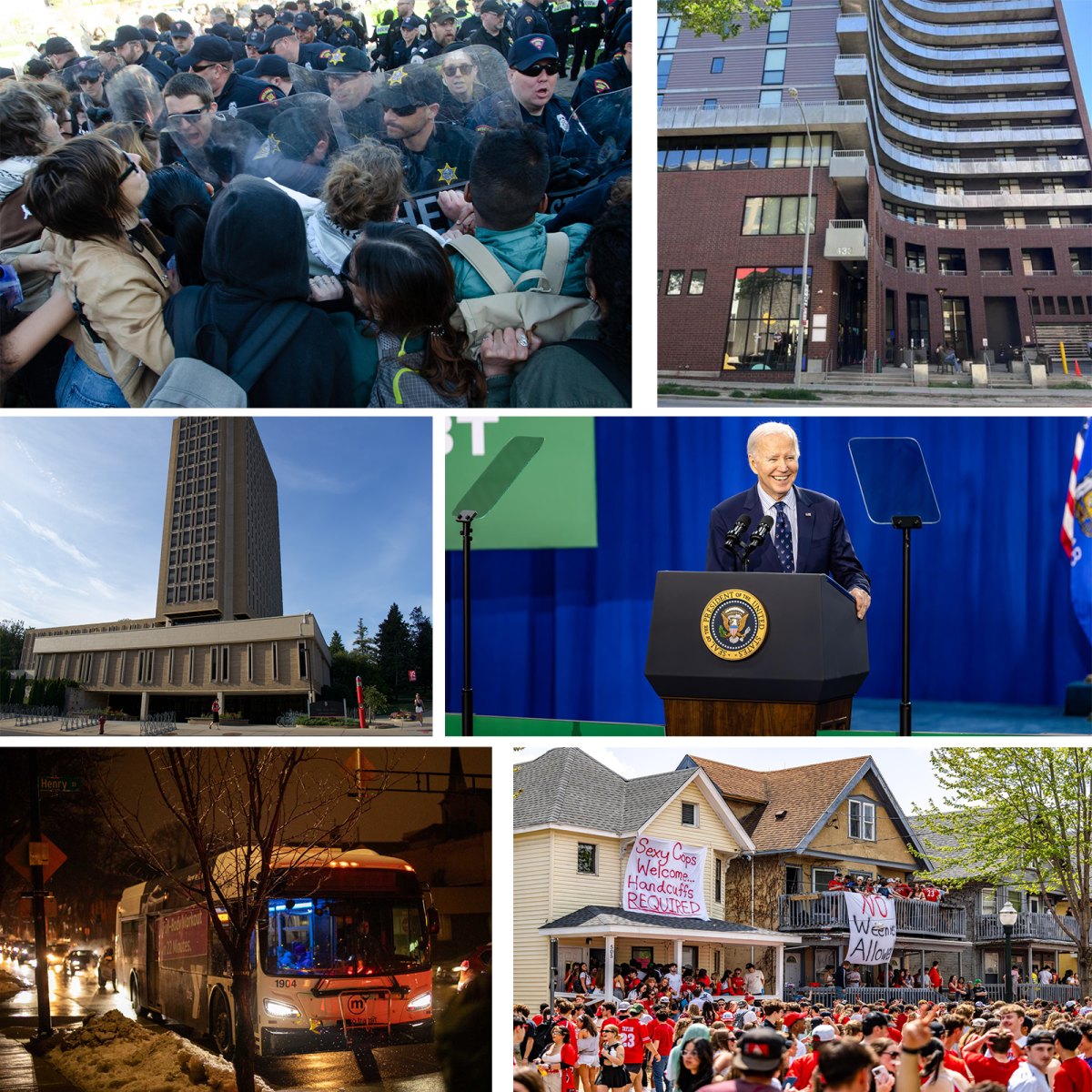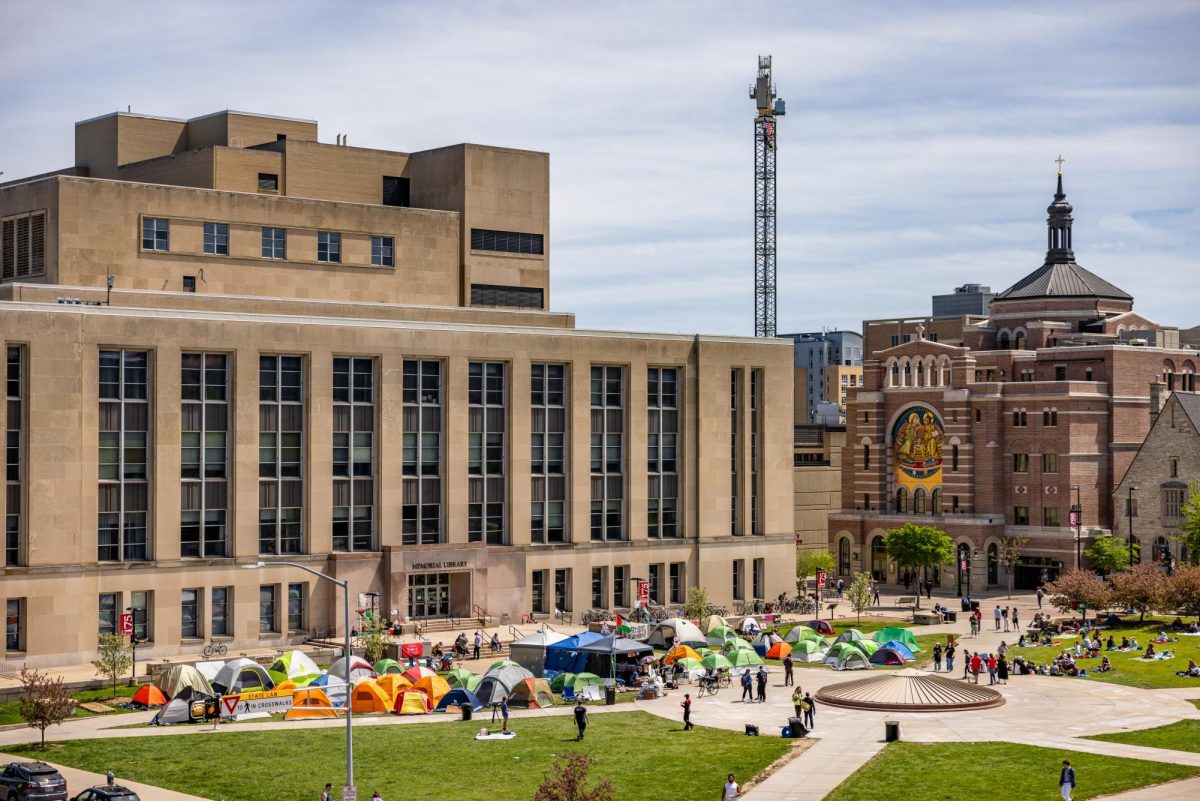Editor’s note: People of UW is a weekly series produced by Madison Hibner. The series — published online and on our social media accounts — aims to highlight a student at UW making an impact on the campus community. These Q&As are lightly edited for clarity and style.
ELI WINTER
It did not take long for Eli Winter to recognize the large homeless population struggling on the streets of Madison during his freshman year. In response, he founded Feed the Change, an FDIC organization that ‘feeds the change’ by distributing meals to the homeless.
Tell us about yourself
I’ve really come into my own since beginning at the University of Wisconsin. I’ve loved exploring everything the campus has to offer and facilitating the extroverted side of my personality. I spend my time hanging out with my friends, bonding with the brothers of my fraternity and working through Feed the Change. Additionally, I enjoy anything active whether it’s playing tennis or basketball with the boys. Overall, I really enjoy pushing myself out of my comfort zone and getting the most out of my time on campus as possible.
Tell us about Feed the Change and how you first got involved.
I was walking home in the frigid February weather of my freshman year. I noticed a man sleeping under a bench while other people used the plastic walls of the bus stop as wind guards. After that moment, I knew I had to do something. I could not get the image of struggling people out of my head. At that point in time, I did not have a ton of free time. I was just acclimating to campus life, joining a fraternity and getting accustomed to coursework. That summer, I volunteered with a group called Wall Street Angels. They are a mobile soup kitchen that distributes meals. I was able to assist in distributing meals, clothing and toiletries all around Milwaukee.
After learning more about the logistics of the organization, I orchestrated the plan for exactly how I wanted Feed the Change to operate. By the time school resumed, Feed the Change was registered with the state of Wisconsin as an FDIC charity and a few months later became a 501(c)(3), a tax-exempt nonprofit organization. Feed the Change is essentially a mobile soup kitchen that also distributes clothing and toiletries out into the streets as well as to local facilities and shelters such as Porch Light. We also work with food-insecure students providing meals alongside the Food Recovery Network which is a local church in the area.
One thing that’s so special about the organization is how closely we work with local restaurants in the area. Because of our 501(c)(3) status, we are able to take food donations of products that would usually go to waste at the end of the day which is tax-deductible for businesses. These donations are repurposed into meals for those who need it. Not only are we helping serve meals, but we also assist businesses in saving money and reducing waste.
Where do the resources and finances of the operations behind Feed the Change originate?
Mainly, it is a combination of in-house fundraising and outside sources. In the past, we have worked with different restaurants like Marigold Kitchen and Insomnia Cookies. Based on the schedules of when restaurants can contribute, we supplement with house meals. One to two times a week, we create cold lunches, consisting of peanut butter and jelly sandwiches, protein bars, granola bars, applesauce, water, fruits and other foods that will not spoil for a few days. Our food is supplied mostly from those two avenues.
How does Feed the Change differ in the ways it benefits students on the UW campus in comparison to residents of the greater Madison area?
As students, we have been able to partner with so many different organizations in just the two and a half years I have been running this operation. Whether it be the American Nurses Association, Greek life sororities, multicultural fraternities or mental health organizations, like Unmasked, we have been able to diversify our organization by connecting with a variety of societies in Madison. These different groups of people function in their own unique committees. As a result, contributors are able to directly see how they are feeding the change in the community as it is happening. Feed the Change allows its members to directly interact with those that are benefitting from our efforts and break down barriers that are associated with mental health and homelessness. This interaction unlocks a new level of Badger pride through connecting the entirety of campus from multiple perspectives rather than the views we are accustomed to.
How do you wish to use your academia and experiences from Feed the Change following graduation?
Honestly, this is something that I was struggling to figure out myself. I plan to go into investment research which does not have a clearly defined relationship with homelessness and food insecurity. However, from my experiences with Feed the Change I’m taking away qualities like empathy that I’ve learned from working with people whose situations are different from my own. I want to continue being as personable as I can and listen to people’s stories, so I can understand and connect with them. I feel that in life those skills can get you really far.
How has the COVID-19 pandemic altered the work of Feed the Change?
For nearly everyone, including small businesses and organizations, our lives shut down for a hot second. When the pandemic started, Feed the Change was going full steam ahead, holding three or four events a week and then we had to completely stop. Everything was so uncertain for a long time, but we really just tried to follow safety protocols like wearing masks, social distancing, wearing gloves and frequent hand washing to make everyone comfortable.
Feed the Change’s relationship with restaurants was also heavily affected. Some of the businesses we worked with had closed and others had tighter margins, reducing their own waste without extra supplies to donate, even if it was tax-deductible. That is where integrating empathy on a professional level came into play.
Since life has begun to return to normal, so have our operations. We are back to meeting three times a week. This semester, we are even integrating a hot food program where we will be able to make chicken, soup, fresh produce and vegetable dishes as part of our distribution. Today, we are still able to work effectively but in the safest way possible.
In what way has taking on more leadership in Feed the Change altered your perception of nonprofit organizations?
Being on the executive board of any organization is a phenomenal opportunity with a steep learning curve when it comes to balancing the social and professional dynamic. You need to make sure you get things done but also in a safe manner. Specifically for Feed the Change, the demographic of people we interact with is so wide. When it comes to the homeless population, there’s a disproportionate amount of mental health issues. It’s critical that we work together with others to create a welcoming atmosphere but also ensure that everyone is safe and respectful, from both parties. Most of creating this environment takes place behind the scenes during the planning process of events. It is walking the tightrope of juggling social and professional responsibilities to produce an environment that is both fun and productive.
How has Feed the Change improved your college experience?
Feed the Change is the best thing to happen to me at UW. This organization opened so many doors of opportunity to interact with incredible people. Working with around 25 different clubs on campus through Feed the Change has facilitated the development of relationships with some of my best friends. Feed the Change has done more than I could ever articulate when it comes to immersing myself in the culture and appreciating everything campus has to offer from a plethora of perspectives. This experience is by far the most impactful thing that I’ve ever done in my life, let alone just my college career.





















